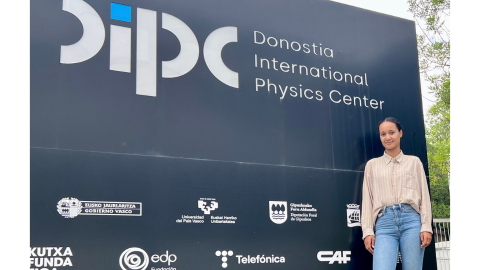Josianne chose an international path right from the start of her studies as she likes to discover new countries. She completed an international Bachelor’s degree in chemistry at the University of Bordeaux and undertook a mobility at the University of California Santa Cruz.
She then completed a Master’s Degree in chemistry at the University of Hamburg. During her internship, she spent 3 months in Bordeaux at the Institut des Sciences Moléculaires and 3 months in Spain at the Donostia International Physics Center (DIPC), and wrote a dissertation. Following her internship, she and her internship supervisor, in collaboration with the DIPC teams, thought of a PhD project on Computational study of mechanoluminescence properties of organic materials.
How is your project progressing?
I’m currently pursuing my third and last year of PhD. After spending two years in Bordeaux, I have been conducting my research in San Sebastian in Spain since September 2024. The aim of my thesis is to understand the mechanisms involved in light emission phenomena at the quantum level on organic materials and to study the control of some of these parameters.
I mainly work on the computer but I’m also in contact with laboratory teams. For example, mechanoluminescence is a phenomenon in which light is emitted by mechanical action, without the need for an electrical source. In the future, we can imagine mechanoluminescent sidewalks that light up under the pressure of our footsteps. It is therefore essential to understand the underlying mechanisms and master the optical properties of these materials, in order to advance the development of innovative solutions in line with the challenges of the ecological transition.
Besides I also like to participate in scientific outreach initiatives to promote science and meet young people. In Bordeaux, I joined the Femmes & Sciences association, I presented the association in Bordeaux’s colleges and high schools and in tradeshows. I also animated workshops in Cap Sciences and participated in My thesis in 180 seconds contest and the Science week in Spain…
How do you feel this experience will benefit you?
I love to travel and discover new countries so the cotutelle program offers advantages. This program offers the opportunity to live in two different countries, to join two research teams and to benefit from a wider scientific network. According to me, one of the main advantages is the double degree.
I plan to pursue a post-doctorate in Canada in order to discover another subject in physical chemistry in environmental sciences while using my skills in computational chemistry. My long-term goal is to become an independent researcher. Thanks to the cotutelle doctoral program, I can demonstrate that I have already lived in different countries and discovered other approaches to research. This experience contributes to my open-mindedness and my ability to work with international teams… I chose this program because I like to take up challenges. From my point of view, it is a great opportunity to adapt to new environments without knowing the language or the culture. It is gratifying. We can sometimes feel lonely but living abroad is a very unique and positive experience!
Any advice for future PhD students?
You have to be daring and take risks! If they have the opportunity, I advise them to go abroad, whether as part of a cotutelle or mobility program, or for events. Taking part in conferences, for example, gives you the chance to meet people of different nationalities, to talk to scientists of the same age, facing the same problems, or working on the same subjects.


